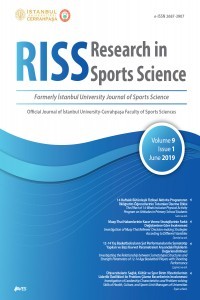Güreş Eğitim Merkezlerindeki 12-16 Yaş Sporcuların Motivasyonel Faktörlerinin İncelenmesi
Sporcuların motivasyonel kriterlerinin ve etki oranlarının belirlenmesi ile motivasyonda isabet yüzdesinin artırılmasına çalışılması amaç edinilmiştir. Çalışmada, 8 bölgedeki güreş eğitim merkezlerinden gelen 157 anket sonucu materyal olarak ele alınmıştır. Buna göre; % 77,07’si şampiyon olmak, % 10,83’ü saygınlık kazanmak % 8,28’i ailelerin istediği, % 3.82 sinin ise maddi kazanç için güreş yaptığı belirlenmiştir. Aile büyüklerinin yarışmaya veya antrenmana gelmelerinden % 66,24’ünün olumlu, % 21,66’sı etkilenmediğini, % 12,10’u ise olumsuz etkilendiğini belirtmiştir. Arkadaşlarının gelmesinden % 70,06’sı olumlu etkilendiğini, % 24,20’si etkilenmediğini, % 5,74’ü olumsuz etkilendiğini belirtmiştir. Kız arkadaşlarının gelmelerinde, % 56,69’unun olumlu etkilendiğini, % 22,29’u etkilenmediğini % 21,02’si olumsuz etkilendiğini belirtmiştir. Olumlu tezahürat, % 82,80’ini olumlu etkilediği, % 6,37’sini olumsuz etkilediği, %10,83’ünü etkilemediği görülmektedir. Olumsuz tezahürat, % 49,05’ini etkilemezken, % 38,85’ini olumsuz % 12,10’unu olumlu etkilediğini belirtmişlerdir. Rakiplerinin önceki başarıları % 60,51’i etkilemediğini, % 21,02’si olumlu % 18,47’si olumsuz etkilediğini belirtmektedirler.Rakiplerinin görünümlerinin, %73,89’u etkilemediğini % 18,47’si olumsuz etkilediğini, %7,64’ü olumlu etkilediğini belirtmektedirler. Kaliteli malzeme, %59,24’nü olumlu etkilediğini, % 31,21’i etkilemediğini, % 9,55’i, olumsuz etkilediğini belirtmişlerdir. Tanıdıkları bir hakemden, % 57,96’sı etkilenmediğini, % 35,03’ü olumlu, % 7,01’i olumsuz yönde etkilenmektedir. Haksızlık yaptığını gördükleri, duydukları hakemin yönetiminden % 51,59’u olumsuz etkilendiğini, % 25,48’i etkilenmediğini, % 22,93’ü olumlu etkilendiğini belirtmişlerdir. Müsabaka öncesi alınan bir ödülden, % 63,69’u olumlu, %33,13’ü etkilenmeyeceğini ve % 3,18’i de kendini zorlamayacağını belirtmiştir. Müsabaka sonrasında, alınan bir ödülün % 56,69’u sonraki müsabakaya daha iyi hazırlanırım, % 25,48’i etkilenmem %17,83’ünün de ödül için maç yaptığımın düşünülmesi beni üzer şıkkını işaretlediği görülmektedir. Sonuç olarak her branşın sporcusunun her yaş dönemindeki motivasyonel unsurlarının incelenerek bilimsel bulguları doğrultusunda motive edilmesinin gerekliği vurgulanmaktadır.
Anahtar Kelimeler:
-
Investigation Of Motivational Factors Of The 6-11 Age Group Athletes At The Wrestling Training Centers
In this study 157 questionnaire results obtained from wrestling training centers in 8 different regions are handled as material. The factor in the wrestlers' choosing wrestling sport was asked and seen that 77.07 % chose it to become champion, 10.83 % to be respected, 8.28 % with the family orientation and 3.82 % for earnings. If the eldermembers of the family come to the training or competition 66.24of them are posizively influenced, 21.66 % are not influenced and 12.10 are negatively influenced. If their girlfriend come to the training or competition 56.69 % are positively influenced, 22.29 % are not influenced and 21.02 are negatively influenced. Negative or positive audience manifestations have influence over the sportsmen. In respect to this, positive manifestations of audience positively influence 82.80 % of the wrestlers, negative manifestations of autience do not influence 49.05 % of them , negatively influence 38.85 % and positively influences 12.10 of them. When the effect of previous successes of the rivals are investigated, 60.51. % of the wrestlers are not effected, 21.02 % are positively affected and 18.47 % are negatively influenced. Physical appereance of the rival does not influence 73.89 % of the sporsmen, negatively influences 18.47 % of them and positively infuences 7.64 % of them. When the wrestlers are about the influence of using high quality materials, 59.24 % of them are positively motivated by it it does not effect the motivation level of 31.21 % of them and 9.55 % are negatively motivated. If the wrestler is acquainted with the referee or if he saw or heard that the referee acts unjustly he is also effected differently, When the referee isknown by the wrestlers, 57.96 % stated that they are not influenced, 35.03 % are positively influenced and 7.01 % are negatively influenced. If the competition is directed by a referee whom the wrestlers saw or heard to act unjustly, 51.59 % of them expressed tkhat they are negatively influenced, 25.48. are not influenced and 22.93 % are positively influenced. When the effect of being awarded before the competition is researched and 3.18 ofthem stated that they will not force themselves due to this award. Finally when the influence of an award given after a competition is researched 56.69 % of the wrestlers expressed that they would get prepared for the next competition in a better way, 25.48 % of them stated that they would wellcome it naturally and not be effected and 17.83 % of them mentioned that being thought that they compete for the award will upset them.
Keywords:
-,
___
- Balcı S., (1987):”Öğrenmede Motivasyon” G.Ü. Sosyal Bi- limler Ens., Ankara.
- Başer E. (1985) “Spor Psikolojisi”M.E.G.S.B. yay. Ankara
- Carlson Neil R. (1986)’’Psycholog The Science of Bahavi- or’’ Second Edition Allyn and Bacon, Inc. Boston
- Kaya Y. (1999) “Performansta Üçüncü Boyut Hipnoz Ve Spor” Selçuk Üniv. Matb. Konya
- Özbaydar S., (1983): “İnsan Davranışlarının Sınırları ve Spor Psikolojisi”. Altın Kitaplar Y., İstanbul.
- Öztabağ L., (1974): “Antrenörlük Psikolojisi” Futbol Fed. Yay. İstanbul.
- Rudolf L.C., (1982). “Ringon-raufen als Psyshoomotori- cshes Bildungs-und Erkiehhungsmittel”, Verlog -Modernes Lernen, Dormund.
- Başlangıç: 2019
- Yayıncı: İstanbul Üniversitesi-Cerrahpaşa
Sayıdaki Diğer Makaleler
6-11 Yaş Grubu İlköğretim Çağı Hareketli ve Hareketsiz Çocuklarda Obezite Prevelansının Belirlenmesi
Elektriksel Kas Uyarılarına Karşı Tolerans Gelişimi
Yeşer Eskicioğlu, Gazanfer Doğu, Selami Özsoy
Futbolcularda Yaralanma Önleme Programları (Derleme)
Mehmet Öztürk, Hanife Ataman Yancı, Ayşe Türksoy, Evren Yıldız
Suzan DAL, İlhan ODABAŞ, Nalan SUNA, Çiğdem BULGAN, Selda AKKAYA
Güreş Eğitim Merkezlerindeki 12-16 Yaş Sporcuların Motivasyonel Faktörlerinin İncelenmesi
